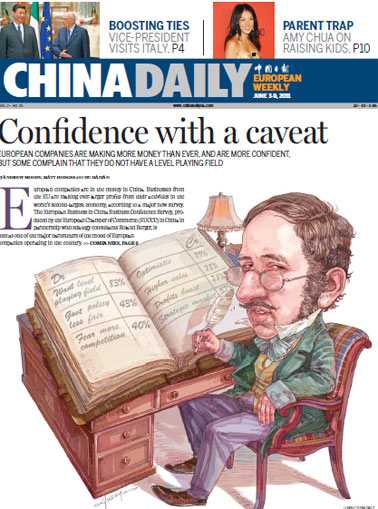Confidence with a caveat
Updated: 2011-06-03 10:47
By Andrew Moody, Matt Hodges and Hu Haiyan (China Daily European Weekly)
|
 Lu Jinyong, from the University of International Business and Economics, says many European companies have been fully integrated into the Chinese economy. [Wang Jing / China Daily]
|
He said this was also true of the banking sector, where European banks were facing tougher rules and supervision.
"The situation for small- and medium-sized European banks is getting more and more difficult. On the regulatory side, it is getting more complicated, with the supervisory bodies asking for more reports and this kind of thing," he adds.
Wu Changqi, professor of strategic management at Guanghua School of Management at Peking University, says European companies often have a perverse attitude to regulations because it is they who are often the beneficiaries.
"Regulations often affect European companies the opposite way they say. When the Chinese government brings in tougher food safety regulations, carbon emission controls and environmental protection legislation this, on balance, tends to favor higher quality imported products, which have already had to meet more stringent regulations in their own countries."
Wu said recent moves by the Beijing municipal government to control the number of new cars so as to ease congestion by implementing a quota determined by a lottery benefits foreign car manufacturers.
"If you bring in a quantitative quota like this, if someone obtains the right to buy a car through a lottery, he or she is more likely to buy an Audi, BMW or Mercedes-Benz than a 30,000 yuan budget Chinese car since people want to make more use of their allocation," he says.
|
 |
Moens, however, who has been in China since 2002, says there were still problems relating to access to the China market, particularly in areas such as public procurement.
"This is particularly true in the construction sector and affects many European companies in design, engineering as well as architects," he says.
"To get a qualification to apply for projects in China you often need to prove a track record of buildings you have worked on in the country. This is the sort of chicken and egg situation a number of companies face," he says.
"They are then forced into joint ventures with Chinese companies whether they want to do that or not. This is where there is a real barrier to operating in the market."
Lu Jinyong, director of theChina Research Center for Foreign Investment at the University of International Business and Economics in Beijing says many European companies need to come to terms with the Chinese government gradually withdrawing favorable benefits foreign companies received after reform and opening up.
"Some favorable policies have been cancelled as the Chinese economy has developed. Foreign companies are now treated the same as Chinese domestic companies. This process requires a kind of adjustment and understanding from foreign companies," he says.
China unified income tax rates for domestic and foreign-funded companies at 25 percent in 2008.
Wu at Guanghua School of Management believes European companies often exaggerate their problems.
"If you look at Chinese private companies they have real problems accessing finance at the moment from domestic banks. They can't get loans. At least European companies have access to sources of funding outside of China," he says.
He also questions whether some have a real commitment to doing business in China at all.
E-paper

Tapping into the future
Foreign companies are investing in China's water industry as many predict a growing profit margin.
Preview of the coming issue
Headhunters ride on growth
Commercial property rides wave
Specials

Cuisine central
London's Chinatown is helping diners appreciate full palate of Chinese food

Tying the knot
Danish couple's high-end macrame export business takes off in the mountains of Yunnan.

Truly a super woman
Li Yuchun first came to prominence in 2005 as the Super Girl winner, and since then has become an international star.
